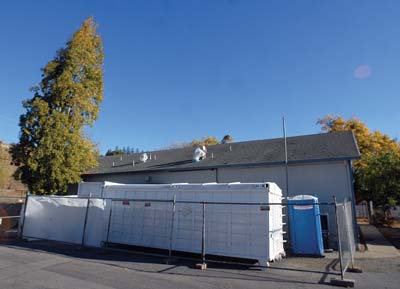The Homeless Coalition of San Benito County and the Farm Labor Association will be working with the board of supervisors to mediate a conflict that has arisen this winter season over the use of kitchen facilities at the migrant camp on Southside Road.
At the heart of the conflict is the Farm Labor Association’s contract with a new vendor to provide meals to the migrant population, which thins substantially during the winter months when the homeless shelter opens at the camp. The contract with the vendor, A New Choice, requires the vendor to make serving meals to the migrant workers a priority but it also allows them to use the kitchen facility to prepare for-profit meals that can be served off site.
Volunteers from the Homeless Coalition are frustrated that they have limited access to refrigerators and freezers on site, and that this year they have been required to bring their own cooking equipment. Mindy Sotelo, the executive director of the Farm Labor Association, said she held a meeting between the two parties before the shelter opened to discuss the needs of the Homeless Coalition and she was unaware that the arrangements had not been working.
Complicating the matter, the vendor did not have the proper conditional use permit or health permits when the county counsel drafted a letter to notify the company of the steps it needs to take to become compliant in January. Sotelo said the health permit has since been renewed.
Enrique Arreola, the deputy director of Community Services and Workforce Development, said he has been working with the Farm Labor Association to make sure the vendor is in compliance with state requirements that come into play – because the county received a state loan to renovate the kitchen facilities for the benefit of migrant workers.
Arreola said in talking with state employees about the matter, it does appear that the vendor can sell for-profit meals to external agencies as long as the priority is given to the migrant workers.
“During the winter months they provide meals outside (the camp) to make ends meet,” Sotelo said. “We can’t expect them to do it for free.”
Arreola has been working with Shirley Murphy from the county counsel’s office to work through the legal requirements.
“There are dire consequences if the state finds us in breach,” she said, of the terms of the loan. “We want to make sure we keep the state happy or we will have to pay back the $3 million loan.”
Murphy said they need to work out the issues before the migrant camp fills up during the growing season in a few months.
The issue first came before the supervisors in January, when it was brought to the attention of board members that the Farm Labor Association might be in breach of contract with the county from which it leases the migrant camp due to contracting with a vendor without county approval. Arreola said he had sent a letter in August to let the association know it must bring any subleases before the board of supervisors for approval. Sotelo said they believed because they used a subcontract with the vendor rather than a sublease that they were in compliance with the county requirement.
At the recent meeting, volunteers from the Homeless Coalition discussed their frustrations with cooking meals in the kitchen this year.
Bill Coates, a volunteer, said he has been working with the coalition for several years.
“This year, there were three or four commercial fridges and we had access to one fridge,” Coates said. “It was much more difficult to operate. I’m not sure what can be done.”
Judi Johnson, a volunteer with a 10-year history, said she was surprised to find freezers and equipment locked up.
Sotelo said when she met with representatives of the Homeless Coalition, they said they would bring their own commercial refrigerator to use and that they agreed it made sense for A New Choice to lock the freezers since they would be keeping valuable meat inside. They also agreed each group would use separate cooking equipment so there would be no disputes over leaving behind dirty or damaged pots or pans.
“I walked away feeling good and, unfortunately, it didn’t work,” she said.
Sotelo said they were at the point where they were having surveillance cameras installed to stop finger-pointing over damaged equipment and missing food.
“I don’t want to talk about refrigerators,” said Supervisor Anthony Botelho, at the Feb. 19 meeting. “The labor camp got the grant because it is a labor camp, not a homeless shelter. But it is a partnership that has worked for years.”
Sotelo said the sublease with the Homeless Coalition predates the renovations of the kitchen facilities.
The supervisors agreed to create an ad-hoc committee to work out the negotiations with the three parties, with Supervisors Jerry Muenzer and Jaime De La Cruz to serve on the committee.










